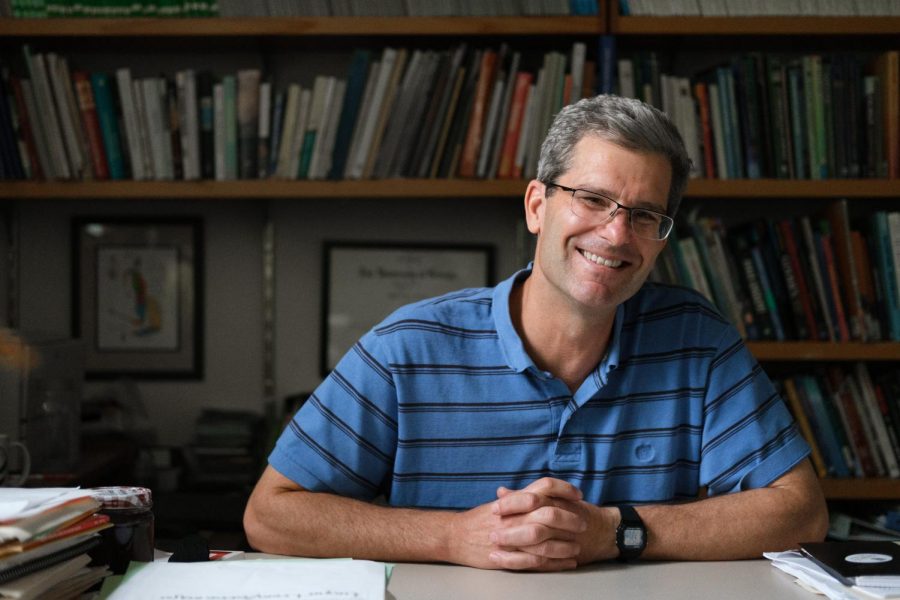Moseley appointed to UN steering committee
September 26, 2019
Geography professor Bill Moseley has been appointed to a United Nations advisory committee on food security and nutrition.
The 15-member High Level Panel of Experts Steering Committee (HLPE), a part of the United Nation’s Food and Agriculture Organization, is based in Rome. The members assess the state of global food security and nutrition and provide policy recommendations to the UN General Assembly. He will serve a two-year term.
Members come from a wide range of disciplines, from genetics to nutrition, and hail from an array of United Nations member countries. Moseley, who specializes in tropical agriculture and food security and directs the food, agriculture, and society (FAS) concentration at Mac, comes to the HLPE with a perspective different from many in the field.
“I’m pretty critical of what I would call conventional productionist agriculture,” Moseley said.
Productionist agriculture is an approach to food security centered on maximizing crop production. While this approach often dominates discussions of food security, Moseley is interested in “agroecology” — treating farming systems like ecosystems and finding ways to develop food systems that don’t require costly fertilizers and herbicides.
He also noted the importance of recognizing how the challenges of food production are location-specific.
“You can’t just take a farming system that’s been developed in Iowa and plunk it down in West Africa and expect it to work the same way,” Moseley said, “There’s a long history of trying to do that, because we’re not always conscious of the ecological context in which farming systems are developed.”
Moseley has worked on food security issues from both academic and developmental perspectives. He has led numerous research projects, including a project in Botswana, studying urban and rural food insecurity. He has also done National Science Foundation-funded work in South Africa on post-apartheid land reform.
In addition, Moseley has served as an associate editor of the academic journal “Food Policy” and has held positions with Save the Children and the United States Agency for International Development and the World Bank.
Provost Karine Moe nominated Moseley for the role after he brought the position to her attention.
“As an internationally recognized expert on food security and tropical agriculture, with significant experience in Africa, Professor Moseley will bring to the committee deep knowledge and a critical perspective,” Moe wrote in an email to The Mac Weekly.
The appointment of a professor from a small liberal arts college like Macalester to a UN committee is relatively unusual. Moseley is the fourth person from the United States to serve on the HLPE; all three prior members were affiliated with major research universities. Moseley credits his appointment in part to Macalester’s strong commitment to research even in the context of a liberal arts education.
“What’s really special about Mac is that we recognize the synergies between research and teaching,” Moseley said. “I think a lot of liberal arts professors have not been able to publish enough or they have not had leadership positions with academic journals… They haven’t had the name recognition to get appointed to these types of committees.
“And here — just hats off to Macalester — we have a particular model here that allows people who value teaching and working closely with students to do that, but also realizing that some of the best teaching happens when it’s intertwined with research.”
Moseley is also excited about what he can bring back to his students.
“I see this as very complementary with my teaching and research,” Moseley said, “And I think it will make me a better teacher because I will better understand how the policy process works.”
Serving on the HLPE won’t require Moseley to take time off from Macalester. The committee meets only twice a year, in November and May.
Moseley’s expertise isn’t appreciated only by UN decision-makers in Rome.
“My favorite thing about his teaching style is that he teaches the broad concepts, and then how they apply to real-world problems,” Hugh Gabriel ’23, a first-year student in Moseley’s People, Agriculture and the Environment course, said. “And then he makes things interesting by supplying a lot of anecdotes from his research, which is super cool.”
But Moseley didn’t share the news of his UN appointment with his students.
“I didn’t know about it until one of our TAs told us at the end of class,” Gabriel said. “He was very humble, [he] kind of brushed it off and didn’t really want to talk about it.”
Moseley says the FAS concentration gives students a chance to explore what’s happening in the field of food security on a global level.
“Liberal arts colleges — with students who have interdisciplinary training [and] who are thinking about this more broadly from not just a scientific but from a humanities and social science perspective — I think this is where the innovation is going to come from,” he said.













